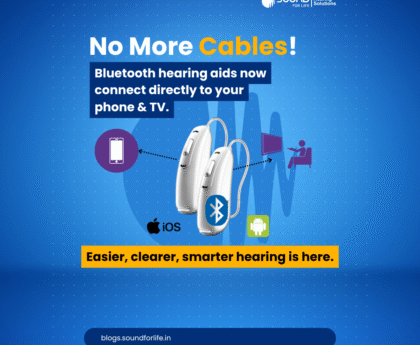Tinnitus is a common problem that affects millions of people around the world. Even in the absence of external noise, a person with this illness may experience ringing, buzzing, hissing, or other noises in their ears. In addition to being extremely unpleasant, this can make it difficult to focus, sleep, or enjoy day-to-day activities. Tinnitus is not an illness; rather, it is a sign of another condition, such as circulatory system issues, hearing loss, or ear trauma.
Using hearing aids is one of the best strategies to treat tinnitus. This blog article will describe how tinnitus sufferers benefit from wearing hearing aids. Additionally, we will examine the many kinds of hearing aids, their functions, and factors to take into account while selecting one.
Understanding Tinnitus
Tinnitus can be temporary or permanent. It can happen in one ear or both ears. Some people hear a soft sound, while others hear a loud noise that never goes away. The most common type of tinnitus is called “subjective tinnitus,” which means only the person who has it can hear the sound. There is also “objective tinnitus,” which is rare and can be heard by a doctor using a special tool.
Tinnitus can be caused by many things, such as:
- Exposure to loud noise
- Hearing loss
- Earwax buildup
- Ear infections
- Stress and anxiety
- Head or neck injuries
- Certain medicines
In many cases, tinnitus is linked to hearing loss. This is why hearing aids can be helpful.
The Benefits of Hearing Aids in Tinnitus

Hearing aids are small electronic devices that are worn in or behind the ears. To improve hearing for those who have hearing loss, they amplify sounds. But hearing aids are not just a device that improve hearing, they improve the standard of living too. Additionally they can lessen the symptoms of tinnitus. Here is how:
- Masking the Tinnitus Sound- When you have hearing loss, your brain gets less sound from the outside world. This can make the ringing or buzzing of tinnitus seem louder. Hearing aids bring in more sounds from your environment. These extra sounds can help cover up or mask the tinnitus sound, making it less noticeable.
- Improving Communication- Tinnitus can make it difficult to hear others, particularly in busy environments. Hearing aids enhance communication by making speech clearer and understandable. When you can hear better, you experience less worry and anxiety which can also reduce the feeling of tinnitus.
- Stimulating the Brain- The areas of the brain responsible for processing sound do not receive adequate information when you have hearing loss. This lack of stimulation can lead to tinnitus. Hearing aids send sound signals to the brain, which keeps certain parts of the brain functioning. Over time this can reduce the intensity of tinnitus.
- Sound Therapy Features- Technologically advanced hearing aids come with smart features like built-in sound therapy, a feature solely intended to assist those who are suffering from tinnitus. These features play gentle background sounds like white noise, soft and soothing music, ocean waves, or natural sounds. These calming sounds help in diverting the brain’s attention from the buzzing or ringing that tinnitus causes. These sounds can promote relaxation, making the tinnitus less noticeable. Those who are facing tinnitus, sound therapy is often used along with other methods such as counselling, stress management, or relaxation techniques to enhance overall comfort and give more relief from those ringing and buzzing sounds.
Types of Hearing Aids for Tinnitus
Different types of hearing aids are available these days equipped with the latest technology to aid different types of hearing loss. The hearing aids that best suit your requirements depend on your hearing loss levels, the shape of your ear, and your lifestyle. Here are the few types of hearing aids, Lets see how it work:
Behind-the-Ear (BTE): These devices are attached to a mould or dome inside the ear and are placed behind the ear. They are effective and appropriate for the majority of hearing loss types.
In-the-Ear (ITE): These are specially designed to conform to the contours of your ear. Although they are simpler to manage, they might not be strong enough to treat profound hearing loss.
In-the-canal (ITC): and completely-in-the-canal (CIC): Smaller and less noticeable, but these hearing aids do not have all the functions of bigger models.
When choosing a hearing aid for tinnitus, look for features like:
- Tinnitus sound therapy programs
- Bluetooth connectivity for streaming relaxing sounds
- Noise reduction to improve hearing in busy places
- Customizable settings for different environments
Benefits of Using Hearing Aids for Tinnitus

Many people who use hearing aids for tinnitus report the following benefits:
- Less awareness of tinnitus sounds
- Better sleep quality
- Improved mood and less anxiety
- Easier communication with others
- Better quality of life overall
Tips for Getting the Most Out of Your Hearing Aids
If you are considering Hearing Aids to treat Tinnitus, the following advice will help you get the most out of it:
- Consult a Hearing Expert – Always see an audiologist or other hearing care specialist. They may assess your hearing, discuss your tinnitus with you, and assist you in selecting the best hearing aid.
- Have patience – Getting accustomed to wearing hearing aids might take some time. It takes time for your brain to become used to the new sounds. Before determining if they are helpful, give it a few weeks.
- Make Regular Use of Them – Even if your tinnitus seems to be improving, wear your hearing aids every day. Regular use helps your brain stay active and reduces tinnitus in the long run.
- Combined with Other Therapies – Hearing aids work best when used with other treatments. Try relaxation exercises, deep breathing, or therapy with a counselor if your tinnitus is linked to stress.
- Keep Them Clean and Working – Take care of your hearing aids. Clean them regularly and get them checked by a professional. A well-working hearing aid gives better results.
Although tinnitus can be quite annoying, there are strategies to deal with it. For those who have both hearing loss and tinnitus, hearing aids are a secure and useful tool. They aid by increasing the volume of sounds, lessening tinnitus, and enhancing hearing in general.
See a hearing professional if you or someone you know is experiencing tinnitus. They can guide you through the process and assist you in selecting the best hearing aid. Life with tinnitus may be considerably simpler with the correct resources and attention.
Remind yourself that you are not alone. Millions of individuals deal with tinnitus, and many of them find relief using hearing aids. Give it a try and see how it can benefit you as well.





